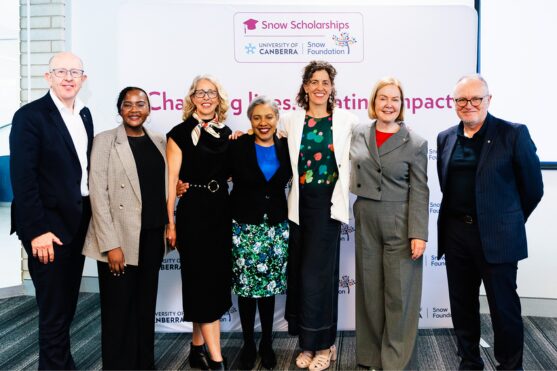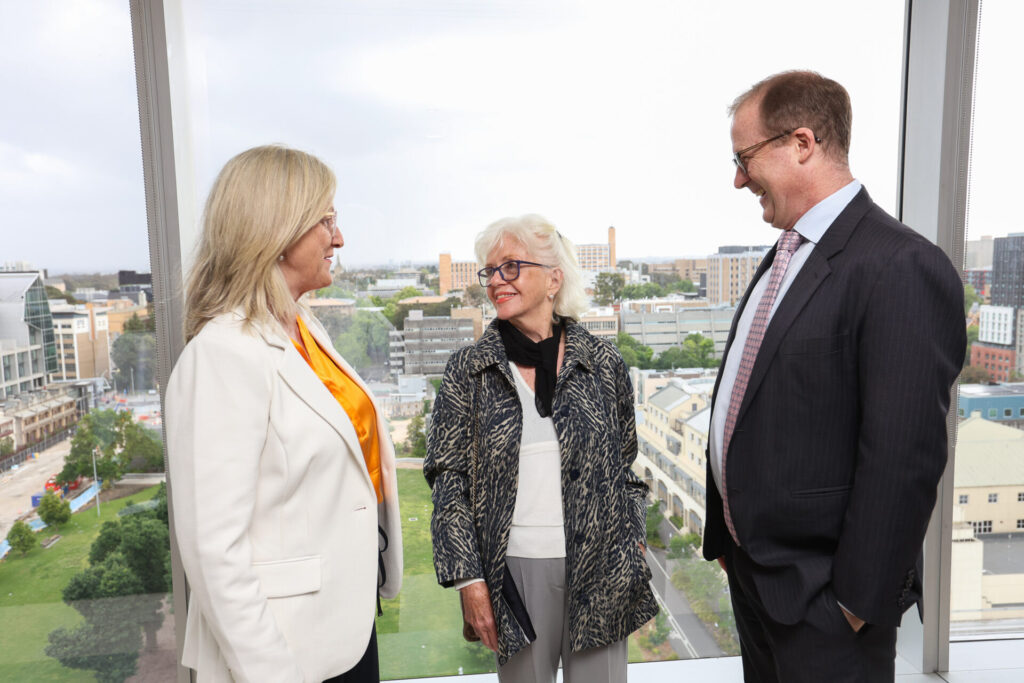
The last fortnight has been a busy one in philanthropy with major gift announcements across higher education and medical research as well as the release of the influential Scanlon Mapping Social Cohesion Research report for 2024.
Pictured above L-R: Stephen Byron AM, Director Snow Foundation; Mushtaha Ahmed, President of the UC Student Representative Council UC; Georgina Byron AM, Chief Executive Officer of Snow Foundation; Professor Maree Meredith, Pro Vice-Chancellor Indigenous Leadership UC; Scarlett Gaffey, Director Snow Foundation; Lisa Paul AO PSM, Chancellor UC; Professor Stephen Parker AO, Vice-Chancellor UC
Snow Foundation and UC partner to expand pathways to higher education
Snow Foundation and the University of Canberra (UC) last week announced a partnership committing to the delivery of 160 Snow Scholarships valued at $20 million over 10 years.
Scholars will each receive support of up to $30,000 per year for the duration of their degree, as well as holistic wrap-around support. This will be one of the most generous and supportive undergraduate scholarship programs per student in Australia.
Snow Scholarships will create opportunities for students with passion and potential who may be facing barriers to higher education and who live in Canberra and regional or rural NSW. The transformative program will empower students to become future leaders, changemakers and innovators, creating impact and influencing meaningful change through access to higher education.
Scholars will benefit from an inclusive cohort, reflecting a diversity of backgrounds, experiences, genders, identities, ages, and academics, allowing them to thrive in a supportive and stimulating environment where they can learn from each other.
Two categories of scholarships will be awarded: Equity and Indigenous Scholarships. Up to 16 Scholars per year will be selected on their leadership potential, commitment to social purpose and academic achievements.
This program will enrich Canberra and the broader community by fostering a new generation of skilled leaders, strengthening the local workforce and contributing to the growth of businesses and community initiatives throughout the region.
“Snow Foundation has a deep connection to Canberra and this partnership with the University of Canberra reflects our commitment to the future of this great city where our family has lived and worked,” said Snow Foundation CEO Georgina Byron AM.
“We believe in the power of education as a driver of change and the Snow Scholarships builds on our existing scholarship program already benefitting 76 students each year, through several partnerships,” Georgina said.
“Our vision is to attract students with smart minds and big hearts and to enable them to reach their potential and make meaningful contributions to their communities and beyond. The ripple effect of Snow Scholarships will be profound, aiming to nurture the next generation of globally aware and socially conscious leaders across sectors – whether in community, business, science, law, health or politics.”
Australia’s social cohesion holds steady but faces strain amid persistent cost-of-living pressures and a challenging global environment
Since 2007, the Scanlon Mapping Social Cohesion Research series has tracked Australians’ views on key social cohesion issues, including trust, immigration, democracy, and globalisation.
The 2024 report, released earlier this week, presents insights from a survey of more than 8,000 participants, and more than 100 questions exploring the challenges and strengths that shape the nation’s social fabric.
The report finds that while social cohesion has remained stable over the past 12 months, key areas of concern for Australians in 2024 include the economy, housing, immigration and safety.
Key Findings:
- Economic Concerns: Nearly half of Australians (49%) view the cost of living as the country’s top issue, followed by housing (15%). Financial strain is widespread, with 41% reporting they are “just getting by” or “struggling”.
- Housing Affordability: Rising housing costs particularly affect younger adults and renters, with 61% of renters facing financial hardship.
- Support for Multiculturalism: Support for multiculturalism remains high, with 85% recognising its positive impact. However, nearly half (49%) now feel immigration levels are too high, driven largely by economic and housing concerns.
- Trust and Safety: Trust in the government has declined, with only 33% expressing confidence that the Federal Government acts in the public’s best interest “most of the time.” Safety concerns are also increasing, particularly among women, with fewer feeling safe walking alone at night.
Despite Pressures on Unity: Australians continue to feel connected to their communities, with 82% agreeing that their neighbourhoods are supportive and inclusive. This resilience highlights the enduring strength of Australia’s social fabric.
To read the full report and key findings, visit https://scanloninstitute.org.au/mapping-social-cohesion-2024
$20 million to support future-focused medical research through generous Galli gift
A visionary gift from Pamela Galli AO will sustain and advance research into neurodevelopmental disorders, skin cancer prevention and treatments, as well as enabling new areas of investigation and research collaboration.
The $20 million donation was announced earlier this week to an audience of researchers and institute partners at the Galli Research Symposium at the University of Melbourne.
The new donation continues the impact of the Pamela and Lorenzo Galli Medical Research Trust established in 2017.
Speaking about her decision to build on her existing donations to the University and its partners, Mrs Galli said: “I believe in supporting the kind of work that brings researchers together to enable medical breakthroughs that save and improve lives worldwide.”
This donation will provide continued support to research teams across the Melbourne Biomedical Precinct so they can progress cutting-edge projects in areas such as: the genetic factors that determine neurodevelopmental disorders, future therapeutics for such conditions, and modelling for cancer prevention and treatments.
